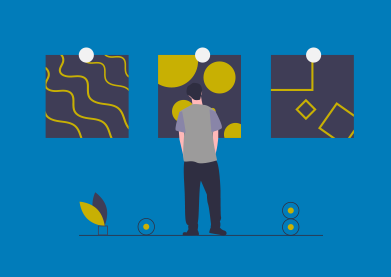I can’t tell you how many times I’ve crossed over the Brooklyn Bridge. One time recently, however, I was awed by the view of downtown Manhattan as I biked in from Brooklyn. Buildings in the distance glistened under a bright blue sky, with the Statue of Liberty to my left and the Manhattan Bridge to my right, as I pedaled up the bridge from the density of Downtown Brooklyn into what felt like an endless expanse over the East River. After countless times back and forth on the Brooklyn Bridge by car, and a few by foot, I saw this view in a new light from my bicycle as I encountered this extraordinary feeling of expansiveness.
Last week, Rabbi Deena taught us about the patriarch Jacob’s magical experience connecting to God in his sleep. Right after he wakes up from his dream, Jacob says, “God was in this place and I didn’t know it!” (Genesis 28:16). We can see in this short exclamation that there can be an element of spirituality, even Godliness, in our experiences existing just beneath the surface. For the patriarch Jacob, that meant that God had been present where he stopped for the night totally unbeknownst to him. For this Jacob, it meant that a soul-stirring view was present on the Brooklyn Bridge every time I had traveled between Manhattan and Brooklyn, and not only when I took note of it.
Now in this week’s Torah portion, Vayishlach, Jacob has another experience that at its surface could be as ordinary as a night’s sleep or a commute. On his way to reunite with his brother Esau, Jacob encounters a mysterious character. “Jacob was left alone, and a man wrestled with him until the rise of dawn” (Genesis 32:25). There isn’t anything particularly spiritual about this encounter at face value. Later verses and texts, however, show that this wasn’t just any man. Jacob realizes sooner this time around that he was in the presence of a divine being (Genesis 32:31). The prophet Hosea confirms that Jacob “strove with a divine being; he strove with an angel and prevailed” (Hosea 12:5). Midrash claims that the man was Esau’s guardian angel and biblical commentators generally agree that while the word itself means “man,” it was an angel who had assumed the form of a human being (Genesis Rabbah 77:3). Through this encounter, we see the same lesson that Jacob portrayed last week when he realized “God was in this place,” that spiritual connections can exist in our midst without realizing it.
The Jewish tradition of waiting for the Messiah provides another example of divinity beneath the surface. There is a story in the Talmud where Elijah the Prophet (Eliyahu Ha-Navi) says that the “Messiah is at the gates of Rome, sitting among the poor, the sick, and the wretched” (Babylonian Talmud, Sanhedrin 98a). Performance artist and playwright Deb Margolin expands this idea by saying, “(The Messiah) could be anybody. You don’t know, so it’s best to be gracious to everyone” (Moment Magazine, 2012). Even the Messiah could seem like a normal person at face value, and hold immeasurable spiritual value beyond what our eyes can see. It can be Beth-El, where Jacob encountered God in his sleep, the banks of the Jabbok river where Jacob wrestled with an angel, the gates of Rome, Brooklyn Bridge, or really anywhere else; our tradition exhibits that each seemingly ordinary moment is filled with spiritual possibility. I hope this Shabbat uncovers glimpses of those moments for all of us.
Please join myself, Rabbi Deena Gottlieb, and Hebrew School Project Director Erin Beser tonight at 6 pm for a family-friendly, musical Shabbat service on Zoom (Meeting ID: 893 4555 7892; Password: JCP). All are welcome to attend, and we also hope to see you next week, to celebrate Hanukkah!

